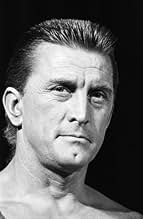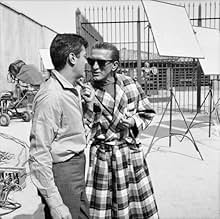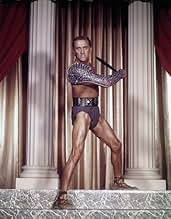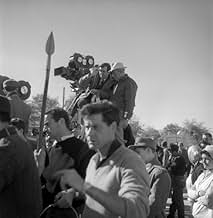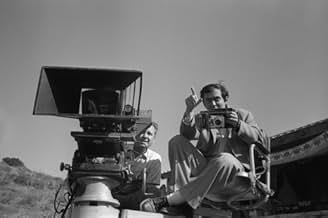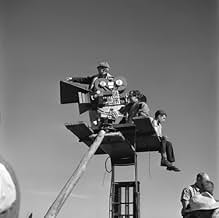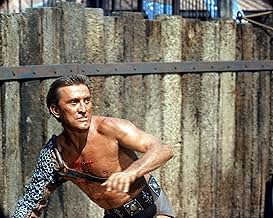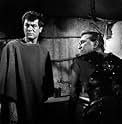The slave Spartacus survives brutal training as a gladiator and leads a violent revolt against the decadent Roman Republic, as the ambitious Crassus seeks to gain power by crushing the upris... Read allThe slave Spartacus survives brutal training as a gladiator and leads a violent revolt against the decadent Roman Republic, as the ambitious Crassus seeks to gain power by crushing the uprising.The slave Spartacus survives brutal training as a gladiator and leads a violent revolt against the decadent Roman Republic, as the ambitious Crassus seeks to gain power by crushing the uprising.
- Won 4 Oscars
- 12 wins & 11 nominations total
Summary
Featured reviews
Overall, maybe not Kubrick's very best, but a fine historical epic. 9/10 Bethany Cox
Spartacus history, based on Howard Fast's novel, is imaginatively brought to life on groundbreaking frames with great production values, outstanding scenarios and Kubrick's control of the massive battles is commendable. Sword cross, drama, gladiators fights abound in this spellbinding adaptation on audacious Spartacus existence, one of the most rebels in the history. Kirk Douglas, whose political leanings are amply on display herein, also served as executive producer , surrounding himself with best talent available. Magnificent climatic battle scenes, featuring 8.000 real, live Spanish soldiers to stunning effect. It is a fitting description of Spartacus character, and it doesn't insult the viewer's intelligence. But it is in the observation of human detail and in many memorable little scenes when the film gets splendor. The picture score most heavily over other epics and in which it finds an inner strength. It's all immensely grand, though predictable , but also its predictability is redeemed in part by the charismatic performances of excellent starring with flawless portrayals and all around with the best talent available. Jean Simmons as Varinia , Charles Laughton as Gracus Peter Ustinov as Batiatus, John Gavin as Julius Caesar, Nina Foch, John Ireland, Herbert Lom, John Dall, Charles McGraw, all do commendably craftsmanlike work. A version featuring Kubrick's 'director cut' is nowadays available featuring a restored, controversial homoerotic bath scene wit Laurence Olivier and Tony Curtis. It contains a rousing and pulsing musical score by Alex North. As well as impressive cinematography in mighty 70mm and on the Giant Panoramic Screen by Russsell Metty with colorful images when the rebels are defeated and crucified along Via Appia, in a sea of crosses silhouetted against a sunset. The film was excellently directed by Stanley Kubrick that gave much-desired financial independence. Anthony Mann is uncredited as co-director.
The Spartacus life was previously adapted in 'Spartacus' (2004) by Robert Dornhelm with Goran Visnjic, Ben Cross, Angus McFayden, Ian McNeice, Rhona Mitra, Alan Bates. 'Spartacus' (1952) by Riccard Freda with Massimo Girotti and Ludmilla Tcherina. 'The son of Spartacus'(1962) by Sergio Corbucci and with Steve Reeves and a silent adapatation Espartaco (2013) by Giovanni Enrico Vidali . And TV series 'Spartacus , Blood and Sand' (2010-2013) with Liam McIntyre, Erin Cummins, Lucy Lawless, John Hanna. The movie will appeal to people enthusiasts for historic deeds and epic feats.
But the result was all worth it. The stars all give top notch performances, but the mark of a really great film is the memorability of each individual in the ensemble. To give a few examples, Charles McGraw as the sadistic trainer at the gladiatorial school, John Dall as Sir Laurence Olivier's protégé, and John Ireland as Kirk Douglas's fellow gladiator trainee are all memorable in the brief roles they have.
Kirk Douglas wisely opts for a straightforward interpretation of a hero in the title role of Spartacus. He's a BC everyman, born into a world which hadn't heard anything about human rights, he knows and feels he's not just cattle. Catch the alternating scenes of Douglas and Sir Laurence Olivier addressing the slave army and the Roman Army. Olivier with his years of Shakespearean training coming across as the tyrant to be, and Douglas in simple prose talking about the slaves fighting for their hopes and dreams. Very effective.
The plot concerns a revolt at a gladiatorial school which mushrooms into a crisis for the Roman Empire. Political factions led by Olivier as Crassus and Charles Laughton as Gracchus seek to use the slave revolt to further their own ends.
Laughton as always is a wonder. It's a bit of unusual casting for him because his parts are usually those of very tortured souls. His Gracchus is a sly rogue, but a decent man. One of my favorite movie lines of all time is delivered by him addressing the Roman Senate where he says he'll "take a little republican corruption for a little republican freedom."
Another sly rogue in the film is Peter Ustinov who won the first of his two Oscars as Batiatus the owner of the gladiatorial school. Like so many others I'm sure in those days, he's just trying to come out on the winning side when doing so could be a life or death situation.
Jean Simmons as Varinia, beloved of Spartacus, has the only woman's part of any substance. But when was Ms. Simmons bad in anything. One of the most underrated and under-appreciated actresses in the history of film.
The lessons about man's desire for freedom and to control his own destiny are eternal and valid. And this film will be also.
Did you know
- TriviaStanley Kubrick was brought in as director after Kirk Douglas had a major falling out with the original director, Anthony Mann. According to Sir Peter Ustinov, the salt mines sequence was the only footage shot by Mann.
- GoofsA truck drives along the hills behind a battle scene.
- Quotes
Tigranes Levantus: If you looked into a magic crystal, you saw your army destroyed and yourself dead. If you saw that in the future, as I'm sure you're seeing it now, would you continue to fight?
Spartacus: Yes.
Tigranes Levantus: Knowing that you must lose?
Spartacus: Knowing we can. All men lose when they die and all men die. But a slave and a free man lose different things.
Tigranes Levantus: They both lose life.
Spartacus: When a free man dies, he loses the pleasure of life. A slave loses his pain. Death is the only freedom a slave knows. That's why he's not afraid of it. That's why we'll win.
- Crazy creditsThe six main cast members are accompanied by an item that represents their character (a chain, a Roman eagle, a wine jug, a couple of hands - one wielding a snake, and a sword).
- Alternate versionsAfter its premiere the film was heavily cut and wasn't shown in its complete form until 1991, when a restored version was re-released. Among the restored scenes is one where where Marcus Crassus (Laurence Olivier) tries to seduce Antonius (Tony Curtis) in the bath. The soundtrack was damaged, so Anthony Hopkins was called in to dub Olivier's lines. In addition, several scenes of violence preview audiences reacted to negatively were restored, including Crassus bloodily stabbing Draba, Marcellus being drowned in the stew, Spartacus stabbing a Roman soldier in the pool, and several gory shots in the final battle, notably Spartacus lopping off the arm of a Roman soldier.
- ConnectionsEdited into Hercules: The Legendary Journeys: Les Contemptibles (1997)
Details
- Release date
- Country of origin
- Official site
- Language
- Also known as
- Espartaco
- Filming locations
- Hearst Castle, San Simeon, California, USA(Crassus' villa)
- Production company
- See more company credits at IMDbPro
Box office
- Budget
- $12,000,000 (estimated)
- Gross US & Canada
- $1,830,650
- Opening weekend US & Canada
- $92,162
- Apr 28, 1991
- Gross worldwide
- $1,856,372
- Runtime
- 3h 17m(197 min)




